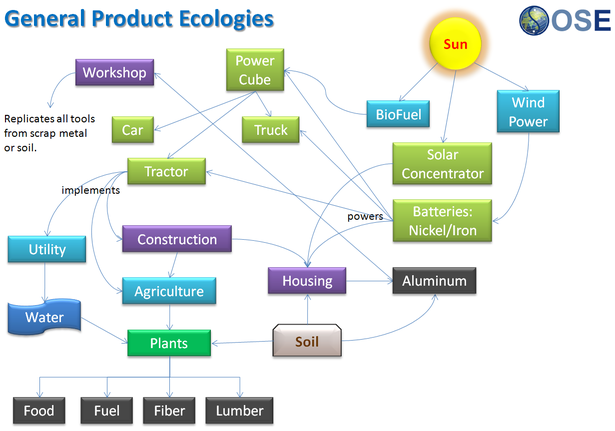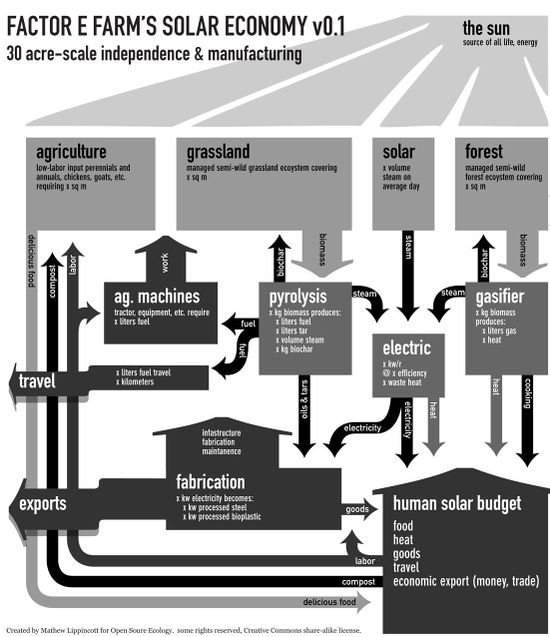Eco-Industrial Park: Difference between revisions
No edit summary |
No edit summary |
||
| Line 4: | Line 4: | ||
==Possible Tenants== | ==Possible Tenants== | ||
(excerpted with modifications from [http://www.indigodev.com/AEIP_HB.html here]) | (excerpted with modifications from [http://www.indigodev.com/AEIP_HB.html here], which has a lot of specific examples and business models). Tenants on an agro-eco-industrial estate may include: | ||
* Suppliers of equipment, energy, materials, and services to farmers | |||
* Food processing and distribution firms | |||
* Firms utilizing by-products from any part of the system | |||
* Intensive food production located in or near an agro-estate, particularly as landscaping, greenhouses and aquaculture ponds | |||
==Agro-Eco-Industrial Park as the core of a farming community== | |||
A rationally designed farming community may have an eco-industrial park as its center. The surrounding farms would be suppliers of raw materials such as biomass. The core park would would be the central "hub" with processing facilities and other specialized services. | |||
==Related pages on this wiki== | ==Related pages on this wiki== | ||
| Line 17: | Line 21: | ||
* [http://www.indigodev.com/AEIP_HB.html "Agro-eco-industrial parks (AEIP)"] (Ernest Lowe), chapter taken from: | * [http://www.indigodev.com/AEIP_HB.html "Agro-eco-industrial parks (AEIP)"] (Ernest Lowe), chapter taken from: | ||
* (older) handbook: [http://www.indigodev.com/Handbook.html "Eco-Industrial Park Handbook for Asian Developing Countries" (Ernest Lowe)] | * (older) handbook: [http://www.indigodev.com/Handbook.html "Eco-Industrial Park Handbook for Asian Developing Countries" (Ernest Lowe)] | ||
[[Image:1b-Generalecolgies.png|615px|thumb|left| Product Ecologies illustrate how the different tools and products of the GVCS work together. This includes how the tools utilize onsite resources for building a modern infrastructure. The goal is to create closed loop industrial ecologies that contribute to environmental and societal regeneration, as humanity regains balance with its natural life support systems. ]] | [[Image:1b-Generalecolgies.png|615px|thumb|left| Product Ecologies illustrate how the different tools and products of the GVCS work together. This includes how the tools utilize onsite resources for building a modern infrastructure. The goal is to create closed loop industrial ecologies that contribute to environmental and societal regeneration, as humanity regains balance with its natural life support systems. ]] | ||
Revision as of 13:30, 23 April 2016
In an Eco-Industrial Park, the use of energy and materials is optimized in such a way that the output of one process is the input into another ("industrial ecosystem"). These arrangements may result in cost savings and waste reduction. The design of the industrial infrastructure attempts to maximize economic and environmental efficiencies. When there is a strong agricultural component, the name Agro-Eco-Industrial Park is sometimes used.
Possible Tenants
(excerpted with modifications from here, which has a lot of specific examples and business models). Tenants on an agro-eco-industrial estate may include:
- Suppliers of equipment, energy, materials, and services to farmers
- Food processing and distribution firms
- Firms utilizing by-products from any part of the system
- Intensive food production located in or near an agro-estate, particularly as landscaping, greenhouses and aquaculture ponds
Agro-Eco-Industrial Park as the core of a farming community
A rationally designed farming community may have an eco-industrial park as its center. The surrounding farms would be suppliers of raw materials such as biomass. The core park would would be the central "hub" with processing facilities and other specialized services.
Related pages on this wiki
Links
- "Agro-eco-industrial parks (AEIP)" (Ernest Lowe), chapter taken from:
- (older) handbook: "Eco-Industrial Park Handbook for Asian Developing Countries" (Ernest Lowe)

